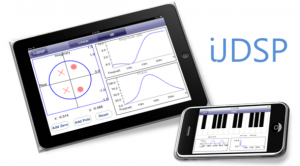
ASU engineers developing versatile new mobile app

Electrical engineering professor Andreas Spanias is director of the Sensor, Signal and Information Processing Center in Arizona State University’s Ira A. Fulton Schools of Engineering. Photo: Jessica Slater/ASU
Posted December 11, 2012
An Arizona State University research center is entering the mobile phone application market with an app designed for a wide range of education and research uses.
There’s been a positive response to the application since it was released earlier this year via iTunes by the Sensor, Signal and Information Processing Center (SenSIP), says Andreas Spanias, the center’s director.
Spanias is a professor in the School of Electrical, Computer and Energy Engineering, one of ASU’s Ira A. Fulton Schools of Engineering.
Within a week of submitting the app called iJDSP to the iTunes app store, it was approved and made freely available on the Apple App store.
“It went through technical certification quickly, which is not a trivial process,” Spanias says. “I am told that many apps do not get certified the first time.”
iJDSP is a mobile application of the JAVA Digital Signal Processing (J-DSP) editor, an internet-based signal processing laboratory developed by SenSIP. It is a tool for DSP simulations, computer laboratories, photovoltaic monitoring and for research in sensor networks and health monitoring.
The app enables the use of digital signal processing concepts on iOS devices such as iPhone, iPad and iPod Touch.
Along with these advanced tools, the app is equipped with simple functions and can act as a learning and outreach tool for middle school and high school students to be introduced to the basic concepts of signal processing and its applications.
“It is a nice product that packages a lot of the things we do,” Spanias says.
The app project is in its second year. “It was officially test ‘beta’ software all of last year, and now anyone can freely download it from iTunes,” Spanias explains.

The iJDSP mobile phone application has the potential to be used in a wide range of education and research endeavors.
SenSIP’s app has also been well received by the center’s peer groups. The Massachusetts Institute of Technology is utilizing the desktop version of J-DSP for its online signal processing courses.
“We have held six workshops internationally on this software to have others assess it and provide feedback to improve our product,” Spanias says.
The iJDSP app was awarded the Premier Award of 2012 sponsored by the academic publishing company John Wiley & Sons, Microsoft Research, and the TechSmith computer software company.
SenSIP received the award in October at the Institute of Electrical and Electronics Engineers (IEEE) Frontiers in Education Conference, where Spanias presented the app in the Premier Award session to about 400 conference participants and IEEE members.
The National Science Foundation (NSF) is supporting SenSIP’s research through three grants totaling about $2 million. Development of the iJDSP app is part of the third phase of a project led by ASU in collaboration with the Rose-Hulman Institute of Technology and Johns Hopkins University.
“The NSF is quite pleased that we received the Premier Award. It has sponsored this research for nearly 12 years and considers this as an exemplary software package at the convergence of education and research in digital signal processing,” Spanias says.
iJDSP is the product of work by several collaborators who are continuing to contribute to its development.
SenSIP works with researchers at Johns Hopkins University to create simulations for earth systems monitoring and geology. The software is used by earth scientists to process and interpret Earth system signals—for example analyzing concentrations of greenhouse gasses and the effect on global temperatures.
Other plans include using the iJDSP app to monitor the performance of photovoltaic panels in solar-energy systems in partnership with a company in Japan.
Several students assisted in researching and testing the iJDSP software. Among them were ASU engineering graduate students Jinru Liu and Shuang Hu.
“Jinru’s innovative software talents were very valuable in getting a beta version of the software running on an iPhone,” Spanias says. Hu established filter design and sensor control functions for the iPhone/iPad.
Spanias is also working with colleagues in the arts and media technology to develop music functions for the application.
An advanced Android version called A-JDSP is to be released in 2013 on Google Play.
When more advanced and specialized versions of iJDSP have been developed, SenSIP researchers are considering creating a company to manage commercialization.
Learn more at the JAVA Digital Signal Processing Editor website.
Written by Natalie Pierce and Heather Beshears
Media Contact:
Joe Kullman, [email protected]
(480) 965-8122
Ira A. Fulton Schools of Engineering



































